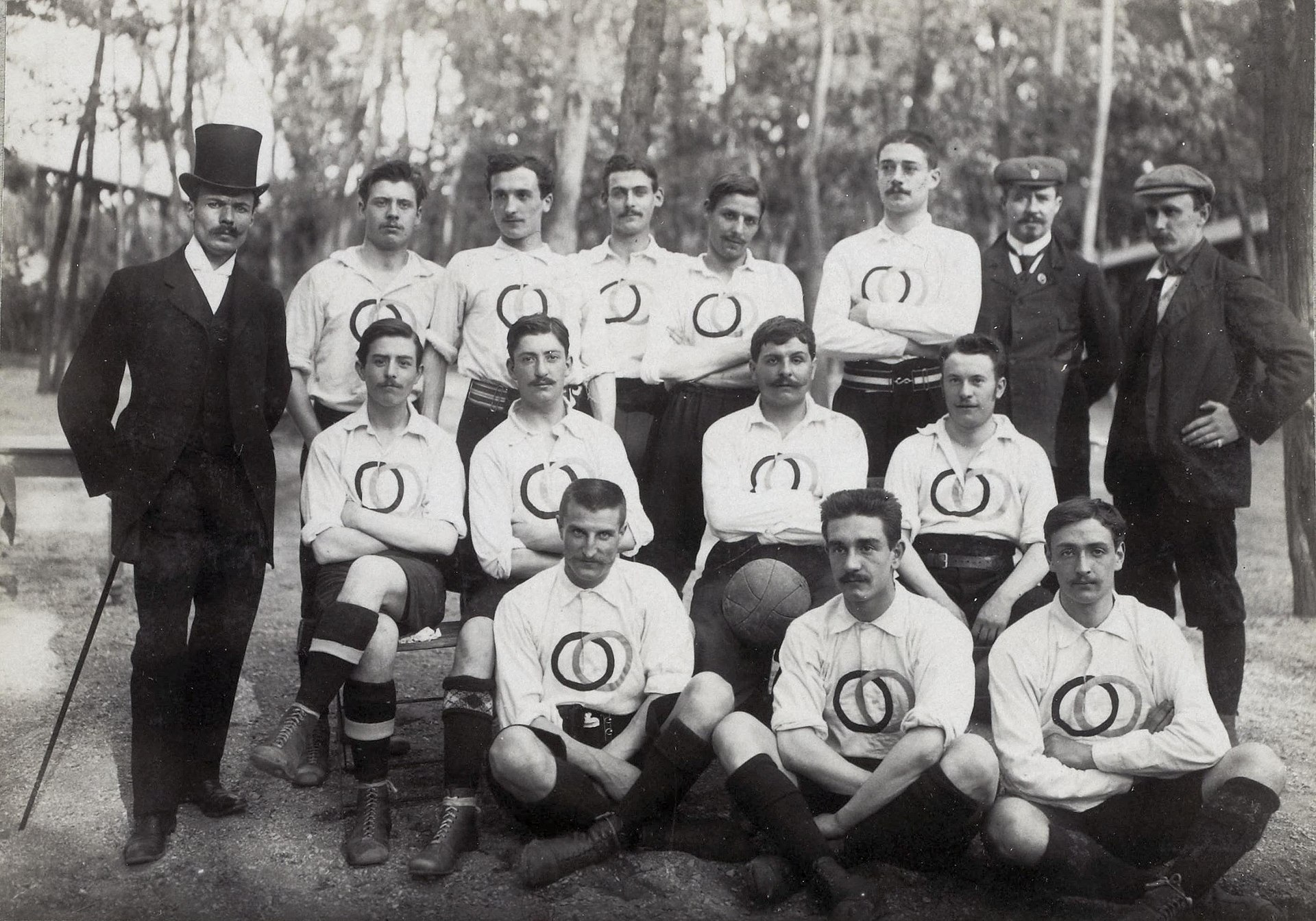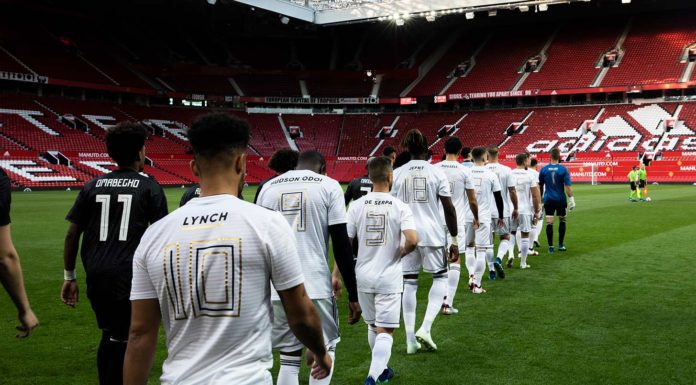As we near the conclusion of the 2024 Olympic football tournament, we take a look at a brief history of the beautiful game’s involvement in the spectacle.
Starting before even the opening ceremony, football was the first sport to take place at the 2024 Paris Olympics, and both the men’s and women’s tournaments haven’t disappointed.
From the very start, it was evident we were in for a show. In the very first match, Morocco went to battle with Argentina, one of the favorites to win men’s gold, and after much drama, a pitch invasion, a delay, and a lengthy VAR check, Morocco came out as 2-1 winners. It was an unprecedented finish to a match and set the tone for what has been a vastly entertaining competition. The women’s side has matched the intensity as well with a handful of dramatic finishes, penalty kick showdowns, and upsets to boot.
But while the Olympics are considered a major tournament for the women, who send senior rosters to the games, the men’s side tends to be overlooked as it is a U-23 tournament, with the exemption of three over-age players per squad.
There is plenty of footballing history at the Olympics, and as we prepare for the latter stages of the knockout rounds this week, let’s go through that history, talk about some iconic players and moments, and look ahead to what should be a pair of breathtaking finals.
Why Are the Men’s Games U-23?
There has been a long-standing battle with the International Olympic Committee (IOC) and FIFA over the terms of football’s inclusion at the Olympics. Professional footballers were not allowed to compete in the early stages, as the Olympics were deemed an amateur competition and organizers had hoped for it to remain in that manner.

Football was first mentioned on the schedule for the 1900 Paris Olympics, but in 1928 at the 27th IOC Session, it was deemed, “impossible for the International Association Football Association to come to an agreement with the IOC regarding the rules of amateurism,” and consequently football was removed. Not to mention, a new development by FIFA called the World Cup would come to fruition in 1930, so the global governing body had even more motivation to pull out of the Olympics in order to promote its new tournament.
In 1935, football would be reinstated for the subsequent year’s games in Berlin, as FIFA came to accept the rules of amateurism. The tension with the IOC remained, however.
Professional footballers were not allowed to compete officially until the 1984 staging, but with the Olympics being their own entity and not an official FIFA-controlled event, the Federation still did not want the games to compete with the World Cup. Consequently, they specified set rules that went on to change in subsequent years:
- 1984: Players who represented a UEFA or CONMEBOL team at a World Cup would be ineligible for the Olympics.
- 1988: European and South American players who had played less than 90 minutes in a single World Cup match were made eligible for the Olympics.
- 1992: The Olympics became a U-23 tournament.
- 1996: Three players over 23 were allowed in each squad (the format that has remained to this day). These were also the games that saw women included for the first time.
It was so fitting that in the first Olympics to include women, the final of the tournament broke the then-fan attendance record for a women’s sporting event. On August 1, 1996, more than 76,000 spectators crowded into Sanford Stadium, home of University of Georgia football, to watch the gold and bronze medal games.
The gold was taken by the hosts, the United States, led by the legendary Mia Hamm. Many lauded this as one of the games and tournaments that propelled the women’s sport onto the global stage, and truly one of the best moments in Olympic football history.
Breakout Stars
Some of the game’s greatest players have competed and won gold at the games in the early parts of their careers. Since the games went U-23, it’s been a wonderful platform for young players to strut their stuff and make a name for themselves on the world stage. Here are just a few of the young players who put on masterclasses at the Olympics:
- 2000: Samuel Eto’o, Cameroon
- 2008: Lionel Messi, Argentina
- 2016: Gabriel Jesus, Brazil
- 2020: Richarlison, Brazil
- 2024: Michael Olise, France
Who Wins?
There are currently four teams left in both the men’s and women’s tournaments, as the men’s semifinals take place later today. Big names on both sides have already made their exits, including Argentina (men’s), France (women’s), and Canada (women’s).
On the men’s side, the winner for me would’ve been whoever emerged from the clash between France and Argentina, two countries that know all about each other in football over the past few years. In the end, the home side emerged victorious in Bordeaux and will face Egypt in the semifinal.
This France squad is absolutely stacked with talent. The experienced marksman Alexandre Lacazette is leading the group, and new Bayern Munich signing Michael Olise is starring in every performance. Under the tutelage of Thierry Henry, this squad is nigh on unstoppable and Olise looks like the best player in the tournament. They were joint top scorers in the group stages with seven goals in three games, and are the only team yet to concede this tournament.
The other half of the draw sees Morocco clash with Spain, which is a mouthwatering prospect in its own right, as both sides looked imperious in the quarterfinals.
On the women’s end of things, a massive pair of semis featuring the United States versus Germany and Spain versus Brazil should have any football fan on notice. The U.S. has looked resurgent under new coach Emma Hayes, although a sluggish quarterfinal match against Japan suggested the team might be running on fumes.
The Germans survived a penalty shootout over reigning gold medalists Canada in their quarters match, and will look to avenge a 4-1 drubbing they took at the hands of the Americans in the group stage.
In the other women’s semi, Spain is coming off a tumultuous penalty victory of their own that saw them come back down 2-0 against Colombia. A last gasp stoppage time equalizer from Irene Paredes just before the final whistle rang kept the reigning World Cup champs alive, and a perfect slate of penalty shots sealed the win. They’ll be taking on a hopeful Brazilian side that emerged victorious in a brutally physical quarterfinal match against the host nation France, that saw 28 total fouls (21 from the Brazilians).
Both matches are must-watch affairs.
The Olympics remains one of the premier stages for fans to see young up-and-coming players represent their nation, and watch some gorgeous footy along the way. The 2024 staging has been no different, giving us fantastic matches, great atmospheres, and unreal individual performances. Long may it continue.








